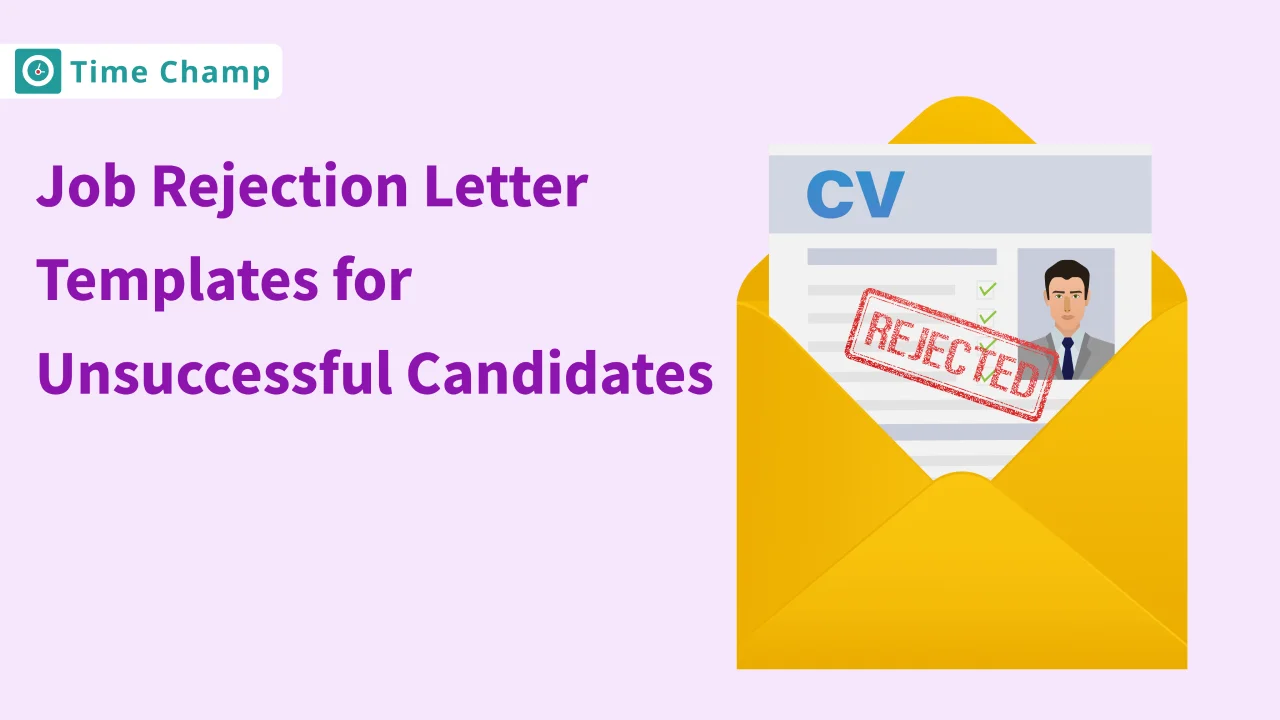Job rejection letters are a necessity in the world of recruiting. Job postings on job portals like Indeed, LinkedIn, and Naukri.com often attract a large number of candidates who submit their CVs directly to the company email. Although numerous qualified candidates keep applying for the same role, not everyone gets chosen. This is when a well-created and careful rejection letter becomes necessary.
What is a Job Rejection Letter?
A job rejection letter is a formal communication sent to candidates who are not selected for a job position after the interview process. It serves as a professional and respectful way to inform applicants that they are not chosen for the role. The letter typically includes a brief thank you for their interest in the position, a notification of the decision, and sometimes a brief explanation for the decision.
The purpose of a job rejection letter is to provide closure to the candidates, maintain a positive impression of the company, and leave the door open for future opportunities.
Types of Job Rejection Letters
When an employer decides not to move on with a specific candidate it becomes important to send that candidate a rejection letter to provide closure. There are different types of Job rejection letters for different stages of the interview.
Here are some of the very common types of job rejection letters.
1. Standard Rejection Letter
This letter is the most commonly used and communicates that the candidate hasn’t been selected. It’s brief yet polite, thanking the applicant for their interest in the role. Despite its simplicity, it ensures the candidate feels acknowledged and respected.
2. Pre-Interview Rejection Letter
When a candidate doesn’t meet the basic qualifications, this letter lets them know early in the process. It politely declines their application and encourages them to apply for more suitable roles in the future, showing the company values their effort.
3. Post-Interview Rejection Letter
This letter is for candidates who’ve gone through the interview but weren’t chosen. It acknowledges their time and effort, expresses gratitude for their interest, and respectfully conveys the decision. It leaves candidates with a good impression of the company.
4. On-Hold Rejection Letter
If a hiring decision is postponed or the role is paused, this letter informs candidates about the change. It reassures them that their application is still valued and keeps the door open for potential future opportunities, maintaining transparency.
5. Finalist Rejection Letter
For candidates who have made it to the final stage, this letter balances disappointment with a little encouragement. It highlights their strong qualifications, acknowledges the tough decision, and thanks them for the effort they put in, leaving a positive and professional impression.
6. Constructive Feedback Rejection Letter
This letter provides very actionable feedback to help the candidates improve themselves. It reflects the company’s appreciation for the candidate’s potential and leaves them with valuable insights for their professional growth.
7. Rejection Letter with Feedback
This letter gives the candidate constructive feedback highlighting the candidate’s strengths. It offers a balanced view of their performance and encourages them to develop further, showing that the company cares about their progress.
8. Re-Applicant Encouragement Letter
For candidates who weren’t selected but showed promise, this letter keeps the relationship alive. It invites them to apply for future roles and reassures them that their skills are valued, fostering goodwill and engagement.
Optimize your team productivity effortlessly with Time Champ’s real-time tracking
Sign Up For FreeBook DemoWhat to Include in a Job Rejection Letter
Here are some elements that make a professional rejection letter:
- Polite Greeting
- Expression of Gratitude
- Clear Rejection Statement
- Brief Explanation for Rejection
- Encouragement for Future Opportunities (Optional)
- Offer of Feedback (Optional)
- Professional Closing
Job Rejection Letter Sample Templates
Here is a list of unique rejection letters tailored for different scenarios:
1. Standard Job Rejection Letter
Subject: Thank You for Your Application
Dear [Candidate’s Name],
We appreciate the effort you put into applying for the [Job Title] position at [Company Name]. After carefully evaluating, we have decided to not move forward with your application.
We appreciate your time and interest in [Company Name] as a future employer We wish you every success in finding the right opportunity for your talents.
Sincerely,
[Your Name]
[Your Job Title]
2. Pre-Interview Rejection Letter
Subject: Update on Your Application
Dear [Candidate’s Name],
Thank you for showing interest in the [Job Title] role at [Company Name]. After reviewing your application, we found that your skills and qualifications do not fully align with the requirements for this role and we decided not move forward with your application at this time.
We truly appreciate the time and effort you invested in the process and encourage you to explore future opportunities that better match your expertise. Wishing you success in your job search.
Warm regards,
[Your Name]
[Your Job Title]
3. Post-Interview Rejection Letter
Subject: Thank You for Your Interview
Dear [Candidate’s Name],
We sincerely appreciate the time you took to interview for the [Job Title] position at [Company Name]. After a careful evaluation, we have decided not to proceed with your application, as your experience does not fully align with the requirements of the position.
It was a pleasure learning about your background, and we hope you find a role that suits your strengths and career goals. Please don’t hesitate to consider future openings with us.
Kind regards,
[Your Name]
[Your Job Title]
4. Constructive Feedback Rejection Letter
Subject: Feedback on Your Application
Dear [Candidate’s Name],
Thank you for your interest in the [Job Title] role at [Company Name]. While we were impressed with certain aspects of your experience, such as [specific strength], we have chosen to proceed with another candidate whose background more closely fits our needs.
We encourage you to continue developing your [specific skill or area] to strengthen your profile for similar opportunities. Best of luck with your job search, and we hope to connect with you again in the future.
Sincerely,
[Your Name]
[Your Job Title]
5. Finalist Rejection Letter
Subject: Thank You for Your Time
Dear [Candidate’s Name],
Thank you for participating in our comprehensive hiring process for the [Job Title] position. Your qualifications were strong, and it was a tough decision to make. However, after reviewing your application, we found that your current skill set and level of experience do not align closely with the role’s requirements, and as a result, we are unable to move forward with your application.
We are grateful for the effort you invested and would be happy to keep you in mind for future opportunities at [Company Name]. Wishing you success in your career pursuits.
Warm regards,
[Your Name]
[Your Job Title]
6. On-Hold Rejection Letter
Subject: Application Update
Dear [Candidate’s Name],
Thank you for showing interest in the [Job Title] role at [Company Name]. At this time, our hiring process has been delayed due to [specific reason, e.g., organizational restructuring]. As a result, we are unable to take your application forward.
We appreciate the effort you put into the process and hope you’ll consider applying for other roles with us in the future. Wishing you success in finding your job.
Sincerely,
[Your Name]
[Your Job Title]
7. Re-Applicant Encouragement Letter
Subject: Encouragement to Reapply
Dear [Candidate’s Name],
Thank you for considering [Company Name] for the [Job Title] role. Although we have selected another candidate for this position, we were impressed with your background and skills.
We encourage you to keep an eye on our careers page and reapply for roles that align with your expertise. We would love the opportunity to review your application again in the future. Best wishes in your endeavors!
Kind regards,
[Your Name]
[Your Job Title]
8. Rejection Letter for Overqualified Candidates
Subject: Application Status
Dear [Candidate’s Name],
Thank you for showing interest in the [Job Title] position at [Company Name]. After reviewing your impressive qualifications, we have determined that this role may not fully utilize your skills and experience, and we will not be moving forward with your application.
We admire your accomplishments and encourage you to explore other opportunities with us that may better match your expertise. We wish you the very best as you continue on your career path.
Best regards,
[Your Name]
[Your Job Title]
9. Rejection Letter for Freelancers or Contractors
Subject: Project Opportunity Update
Dear [Candidate’s Name],
Thank you for expressing interest in collaborating with [Company Name] on the [Project Name]. After reviewing your portfolio and experience, we have determined that your skill set does not fully match the specific requirements of our project, and we will not be proceeding with your application.
We appreciate the effort you invested in applying and hope to work with you on future projects. Wishing you success in your career!
Sincerely,
[Your Name]
[Your Job Title]
10. Personalized Rejection Letter for Senior Candidates
Subject: Thank You for Your Application
Dear [Candidate’s Name],
We were honored to review your application for the [Job Title] role at [Company Name]. Your extensive experience and accomplishments are commendable. After thorough consideration, we sincerely appreciate your interest in the role. However, we regret to inform you that we will not be moving forward with your application, as the required skills and experience for this position differ from our current needs.
Thank you for your interest in joining [Company Name]. We hope you will consider applying for other leadership roles with us in the future. Best of luck with your next professional endeavor.
Warm regards,
[Your Name]
[Your Job Title]
Simple Tips for Writing a Rejection Email
Some simple tips for you to follow while crafting job rejection templates, follow these tips for a professional-looking letter that’s respectful, clear, and leaves a positive impression on candidates.
1. Respond Promptly
Nobody enjoys being left in the dark after an interview. Once you’ve made your decision, let the candidate know right away. Sending a timely response shows you respect their time and helps them move forward with their job search without unnecessary delays.
2. Be Clear About the Purpose
Make the subject line very clear and respectful. Phrases like “Thank You for Your Interview” or “Application Update” work well, as they set the right tone and let the candidate know what to expect from the email.
3. Start with Gratitude
It’s always a good idea to open with a note of appreciation. A line like “Thank you for taking the time to interview with us” acknowledges the effort they put into the process and starts the email on a positive, considerate note.
4. Share the Decision with Kindness
Be very honest about the decision you made but deliver it with empathy. For instance, “We’ve decided to move forward with another candidate, or We regret to inform you that your application has not been selected for this role.” is clear and professional but adding a warm tone can help soften the news and make it feel more human.
5. Offer Feedback (When Appropriate)
If it feels suitable, include a bit of constructive feedback. For example, “Your skills were impressive, but we found another candidate who aligned more closely with the role’s needs.” This can be helpful to the candidate and shows you took their application seriously.
6. Encourage Future Applications
If you really see potential in the candidate, let them know that you will be open to hearing from them again. A message like, ‘We would be happy to see you apply for other roles with us in the future,’ leaves room for future opportunities.
7. End on a Positive Note
Close with a kind message that leaves quite a good impression on the company. Saying something like, “We wish you success in your job search and hope you discover a role that aligns perfectly with your skills,” can create a lasting positive impression.
Why Job Rejection Templates Matter and Benefits
Rejections are never fun to send, but having a thoughtful, well-crafted template makes it easier for everyone involved. Templates save time, maintain consistency, and ensure every candidate feels respected, even when the news isn’t what they hoped for.
Benefits of Job Rejection Letters for Employers
Rejecting candidates is never easy, but having a good job rejection template can make the process smoother for everyone involved. Here’s how these templates can help:
1. Saves Time Without Cutting Corners
Let’s face it, hiring can be hectic. Templates let you respond to candidates quickly, so you’re not stuck writing dozens of emails from scratch. It’s a time-saver that still lets you be thoughtful.
2. Keeps Things Fair and Clear
With templates, you can make sure every candidate gets the same level of respect and clarity. There’s no room for mixed messages or misunderstandings, which helps keep communication smooth and professional.
3. Shows You Care, Even in Tough Moments
As far as I know, there’s nobody who likes to hear a “no,” but a well-written job rejection email can still feel respectful. Templates help you strike the right tone, showing candidates you value the time and effort they put into applying.
4. Balances Personalization and Efficiency
Templates don’t have to feel robotic! You can tweak them to add a personal touch or specific feedback for each candidate. It’s an easy way to stay efficient while still connecting on a human level.
5. Leaves a Positive Impression
How you handle candidate rejections says a lot about your company. A kind and thoughtful email can turn a tough moment into a positive one, leaving candidates with a good impression of your organization.
6. Stays on the Right Side of the Law
Templates are also a safety net for legal compliance. They help you word things carefully, reducing the risk of saying something that could lead to misunderstandings or legal issues.
Conclusion
In conclusion, job rejection letters play a crucial role in the recruitment process by offering closure to applicants and leaving a positive impression of the company. Sending a well-crafted job rejection email to unsuccessful candidates is not just about closing one chapter but also about opening doors for future opportunities. It’s an opportunity to maintain a positive relationship with candidates, uphold the company’s reputation, and contribute to a more compassionate and respectful hiring process overall.
Frequently Asked Questions
Avoid vague language, negative tones, or detailed critiques of the candidate’s performance. Too much formal or generic templates can also feel impersonal. Instead, aim for clear, respectful, and constructive communication that focuses on maintaining a positive relationship.
Rejection letters can encourage reapplication by acknowledging the candidate’s skills and expressing genuine interest in their potential. Highlighting future opportunities and inviting them to stay connected reinforces their value to the company.
Yes, rejection letters for senior roles should be more personalized and detailed compared to entry-level roles. Senior candidates often invest more time in the process, and a tailored message reflecting their expertise helps maintain professionalism and goodwill.
Ensure rejection letters comply with anti-discrimination laws and avoid language that could be perceived as biased or offensive. Be cautious when providing feedback to avoid any misinterpretation or legal disputes.








